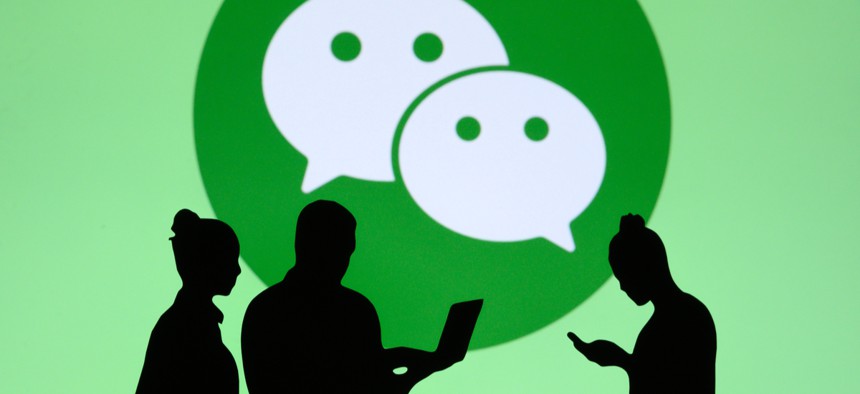Commerce Department to Bar TikTok, WeChat from U.S. App Stores

kovop58/Shutterstock.com
The Commerce Department announced a list of prohibitions meant to protect U.S. national security against the two Chinese-owned apps.
The Trump administration will ban TikTok and WeChat, which boast over 100 million U.S. users, from U.S. app stores this weekend in the name of protecting the U.S. from potential national security threats posed by China.
On Sunday, TikTok, a video app popular among American teenagers, and WeChat, a combination messaging, social media and payment app, will be removed from U.S. app stores, according to a Commerce Department press release and two accompanying notices in the Federal Register.
WeChat on Sunday will face a host of other prohibitions—related to fund transfers, payment processing and the like—as well. TikTok will not be subject to these deeper restrictions yet. Consumers will still be able to use TikTok after Sunday, but not download it anew or download further upgrades.
The Trump administration says the parent companies, ByteDance and TenCent Holdings respectively, pose a national security threat because the Chinese Communist Party could pressure the companies for access to the personal data the apps collect on Americans and use it for espionage.
Commerce Secretary Wilbur Ross took to Fox News Business Friday morning to explain that the moves will have more far-reaching effects on WeChat, which is used widely in China but also by Americans to communicate with people in China. “For all practical purposes” the app will be shut down in the U.S., Ross said.
“As to TikTok, the only real change as of Sunday night will be users won’t have access to improved updated apps, upgraded apps or maintenance,” he said.
TikTok has until November 12—as set by an August 14 executive order—to find a path forward for its U.S. operations.
The company reached a deal with Oracle, in which Oracle would become TikTok’s “trust tech partner” in the U.S. rather fully acquire the company. In a CNBC appearance, Treasury Secretary Steven Mnuchin said the Committee on Foreign Investment in the United States, or CFIUS, would review the proposal.
Lawmakers weighed in, beginning with Josh Hawley, R-Mo. Hawley sent a letter to Mnuchin in which he argued that any deal that falls short of cutting the app, its code and its algorithm away from any entity with ties to the Chinese Communist Party wouldn’t fulfill the mission of the executive order.
“In any event, an ongoing ‘partnership’ that allows for anything other than the full emancipation of the TikTok software from potential chinese Communist Party control is completely unacceptable, and flatly inconsistent with the President’s Executive Order of August 6,” Hawley wrote.
Hawley has been ringing the alarm bell on TikTok for months. In March, he introduced legislation to ban all federal employees from downloading the app on government devices.
A group of Republican Senators led by Marco Rubio, R-Fla., sent a letter to the president arguing along the same lines Wednesday. And Sen. Ted Cruz, R-Texas, threw his hat in the ring on the issue as well with his own letter sent to Mnuchin.
Trump—who reportedly has close ties to Oracle’s co-founder, the billionaire Larry Ellison—received a briefing on the arrangement Thursday. He told reporters the White House has spoken to Oracle as well as Walmart, which also wants in on the deal, though it originally partnered with Microsoft in its bid for the app.
“Well, we’re making a decision,” Trump told reporters gathered on the South Lawn before departing on Marine One Thursday. “We spoke today to Walmart, Oracle—I guess, Microsoft is still involved. We’ll make a decision. But nothing much has changed. We’ll make a decision soon.”
White House Chief of Staff Mark Meadows told reporters the deal “continues to be fluid.”
“There’s no definite proposal that the president’s being asked to consider or reject at this point,” Meadows said.
Other recent federal supply chain rules such as the Federal Acquisition Regulatory Council’s interim rule implementing Section 889, Part B, of the 2019 National Defense Authorization Act mirrors the intent of the TikTok/WeChat action. The rule requires federal prime contractors to excise covered Chinese telecommunications equipment from the supply chain. For the federal contracting community, the rule has a similar kind of drama that the TikTok and WeChat ban has for the general population.
Creeping China concerns flowed into a House Armed Services subcommittee hearing this week, too, prompting a tech emperor to submit his own two cents on TikTok for the record. Former Google chief executive Eric Schmidt, answering questions for Rep. Jim Langevin, D-R.I., told lawmakers the TikTok debacle shows why the U.S. must make serious investments in the development of artificial intelligence technologies as well as bring in talented technologists from around the globe to contribute to U.S. commerce and national security.
“If you look at TikTok, the core achievement of TikTok, although it’s a social phenomenon, is a different kind of AI recommendation algorithm where they are clearly ahead,” Schmidt said. “The moment we started arguing with TikTok over their U.S. operations, the Chinese government banned the export of that algorithm.”
Schmidt added it’s not clear right now how significant the ban is, but he said it’s a problem that the algorithm is no longer available to U.S. researchers.






